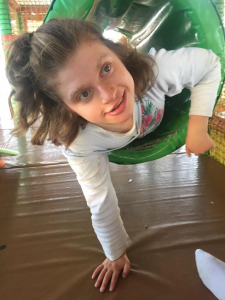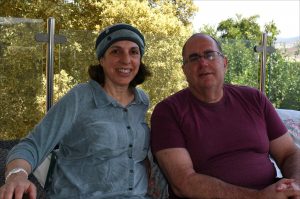Israeli Angelman Foundation Works to Give ‘Strength’ and ‘Answers’ to Struggling Families

Eitan and Tamar Shay visit the Port of Tel Aviv with their six kids. Gil, their 9-year-old daughter — sitting in Eitan's lap — has Angelman syndrome. (Photo courtesy of the Shay family)
From the balcony of their spacious home in the Israeli town of Beit Shemesh, Faige and David Spolter enjoy a commanding view of the Judaean Hills, and the ancient Catholic monastery of Beit Jamal overlooking a ridge in the distance.
The Spolters are modern Orthodox Jews who immigrated to Israel 15 years ago from San Diego. Their blonde-haired and blue-eyed daughter, Atara — the youngest of four children — has Angelman syndrome.
So as soon as they had the chance, the Spolters redesigned their home with Atara in mind, adding features such as locking gates to prevent her from walking into the kitchen unsupervised.
“Renovating our house was a life-changer,” Faige said. “We now have a place for her where she’s safe, but we don’t have to be on top of her 24/7. She’s a very active 20-year-old adult, but she has the awareness of a 1-year old. If we’re not careful, she could put her hands right on the stove.”
“Two years ago, at camp, Atara was taking a bath and accidentally turned the hot water. She was severely burned.”
Seven miles to the north, Eitan and Tamar Shay share a home with a daughter who also has Angelman.
Nine-year-old Gil was diagnosed at 11 months, but her parents knew something was wrong months earlier.
“Naturally Gil can’t speak, and she has slow mental and motor development,” Eitan Shay said. “She started to walk when she was 5 and a half, but only after a lot of work. She was crying and screaming, but eventually we got her to walk.”
These days, he said, “Gil’s walking is very unstable. Most of the time, she holds the hand of someone next to her, and she tends to fall from time to time.”
In addition, “she has sleeping disorders and barely sleeps,” Shay said. “Every couple of weeks, we need to rush her to the emergency room because she gets epileptic seizures. She can’t go to the bathroom and she needs someone to feed her.”
Foundation represents 100 patients
Both the Spolters and the Shays are members of the Israel Angelman Syndrome Foundation, a nonprofit established in 2012 by Eitan Shay — its CEO — and chairwoman Efrat Rabinovich, whose 12-year-daughter, Romi, also has the incurable illness.
“When our own child was diagnosed, we noticed a lack of information both in English and Hebrew — and a lack of physicians who really knew this condition and could tell us what medications to give her, and how we should treat her,” Shay told Angelman Syndrome News in a recent interview. “We were looking for answers and couldn’t find them, so we got together with another family and formed this foundation.”
The group hosted its first conference in 2012, with the cooperation of pediatric neurologist Gali Heimer of Edmond and Lily Safra Children’s Hospital, a unit of Sheba Medical Center. More than 100 people showed up — parents, physicians, educators and government officials.
Since then, the group has slowly grown. Today, said Shay, it comprises 100 children, including three pairs of sisters and brothers. The oldest is 47; the youngest range between 6 months to a year old.
Statistically speaking, based on Israel’s population of 9 million, the country is probably home to around 400 Angelman patients. Besides the fact that many of these patients, especially older ones, have never been diagnosed — Shay said Israel’s Arab minority is underrepresented.
“Reducing the gap between the statistical number of patients and the actual ones in our group is is one of our primary goals,” he said, noting that five Arab families belong to the foundation. “Angelman syndrome can be diagnosed during pregnancy, and it’s a very severe diagnosis.”
The Israeli foundation hosts two events annually: a scientific conference in which parents of Angelman kids get professional, first-hand information about ongoing research and therapies; and a social event for Angelman parents and their siblings that features clowns, a music show and other kid-friendly entertainment.
“We try as much as possible to connect families through Facebook, WhatsApp and email,” Shay said. “There aren’t many Angelman groups. We are all small and weak.”
The foundation operates on a grant of around 100,000 shekels (about $28,000) provided by Tel Aviv-based Check Point Software Technologies, which has kept the group going for the past two years.
It also teamed up with the Netherlands-based Angelman Syndrome Alliance, which groups 14 Angelman parents’ organizations around the world. Among other things, the alliance hosts biannual scientific conferences; the last such meeting took place in October 2018, in Hamburg, Germany; the next one, set for September 2020, will be in Vienna.
Shay, 39, is a hardware project manager at HumanEye Technologies, an Israeli firm that specializes in 3D, computer imaging and image processing. His wife graduated as a lawyer, worked for awhile as a teacher, and now chairs Ahada, a nonprofit that helps special-needs children.
The couple’s daughter, Gil — featured in a news station’s video — is one of six kids; her siblings are healthy.
Help just a phone call away
Gil’s lack of cognition appears to be more on the expressive than the receiving side. As Shay said, “We think she understands much more than she can express. We’ve tried to encourage her to use an iPad, but she’s too excited.”
All in all, he said, “they’re very happy kids. They don’t stop smiling. Gil pays attention to everybody, and has gestures for the people she loves — and also the people she doesn’t love.”
At present, all of Gil’s medications are covered under Israel’s national health insurance system — especially because no specific therapies yet exist for Angelman syndrome. Her visits to Sheba Medical Center are also covered, as is the specialized school she attends in Jerusalem every weekday. The only thing the Shays pay for out-of-pocket is the full-time caregiver from Uzbekistan who lives in their home.
“We made a decision right at the beginning that this is what we get, and we’re going to make the most out of it,” he said. “The foundation gives us a lot of strength, because you feel you’re helping others. Whenever someone’s child is diagnosed with Angelman, either I or Efrat receive a call. It’s not like seven years ago, when we didn’t have anyone to talk to.”
Life with an Angelman child is anything but easy, and in the case of Faige Spolter and her husband, David — a patent attorney who works from home — it was difficult right from the get-go.
“When Atara was born, I couldn’t feed her. She would scream the whole time. Anything that did go down came right back up,” she said. “Atara was finally hospitalized at around six weeks of age after she hadn’t gained any weight. Later, we realized she was in pain from severe reflux.”
Doctors diagnosed the baby with dysphasia — meaning she could not coordinate swallowing and breathing — and fitted Atara with a feeding tube. But the Spolters didn’t know Atara had Angelman until later on.
“I remember telling the doctor, when Atara was 3 months old, that she didn’t cry at all,” she said. “This was my fourth child and I knew something was wrong, but I really had no idea. I also saw she wasn’t making any sounds. There were a bunch of little things that just didn’t add up.”
Special dietary limitations
Atara still uses a G-tube, though she also eats food on her own.
“She likes to feed herself but doesn’t like to have a spoon coming at her,” said her mother. “She eats foods she can pick up herself, like Cheerios, nuts and cashews, and chews them well. This has been a lot of work and therapy, and she’s doing great, but she still gets most of her nutrition through the tube.”
Faige also gives Atara real food through the G-tube. But since the Spolters maintain a strictly kosher home, she uses a Vitamix for dairy foods as well as fruits and vegetables, and a $1,200 Blentec blender (donated by the manufacturer) for meat dishes.
At 20, Atara can walk, but not very far. Every weekday, she’s picked up in a taxi and driven to a special school in Jerusalem. Diagnosed as highly hyperactive, the young woman is currently on anti-seizure medications as well as behavior-modifying medicines.
The three other Spolter children accept Atara “just as a fact of life. If anything, it’s had a positive impact,” said her mother, noting that 22-year-old Elisheva is studying special education and wants to work with the most severely disabled kids as a result of her sister’s condition.
“Atara’s communication is still mainly facial expressions, laughter or pulling on something and that’s it,” said Faige. “It’s very unclear what she understands. … I think she understands a lot of body language and tone more than the language itself. Since laughing and smiling is something she can do, she uses it to communicate in different ways.”
Added her father: “She’s so sweet and so happy. This makes it easier. With the right teachers, she could probably improve beyond our imagination.”











